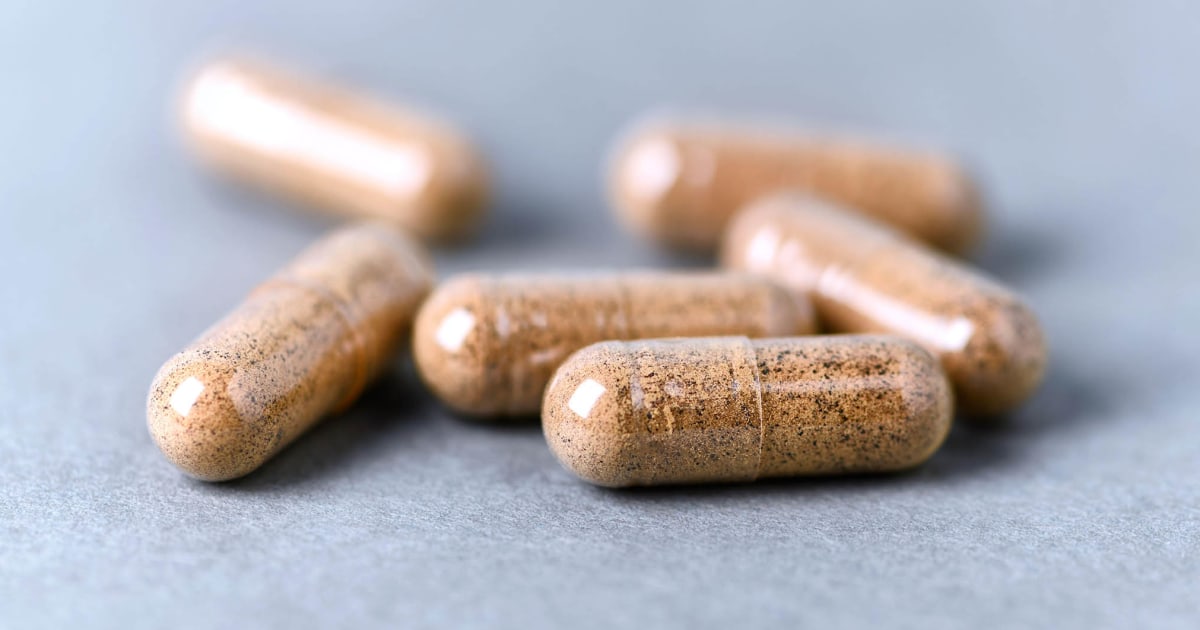Ashwagandha is an herb that’s increasingly popular on social media for a range of health benefits. It’s all over TikTok, where users claim taking ashwagandha can help with stress, sleep, focus and more.
Although ashwagandha has gained recent traction online, the plant has been used in traditional medicine systems for thousands of years. It has also been well-studied, but you may be wondering what the science says about its benefits and risks.
While ashwagandha can be safe to use in the short term, it’s not recommended for everyone.
What is ashwagandha and how is it used, what are the potential health benefits, and what are the risks? Experts discuss.
What is ashwagandha?
Ashwagandha (Withania somnifera) is an evergreen shrub grown in dry regions of Asia, Africa and the Middle East, per the National Institutes of Health’s Office of Dietary Supplements. Also known as Indian ginseng or winter cherry, the ancient herb has been used for medicinal purposes dating back to 6,000 B.C.
“It comes from Ayurveda, which is traditional Indian medicine,” Dr. Zachary Mulvihill, a physician with the Integrative Health and Wellbeing Program at NewYork-Presbyterian, tells TODAY.com. The roots of the plant are commonly dried and ground into a powder.
Ashwagandha comes in a variety of forms, including powder, capsules, tablets and gummies. It is also available as a liquid extract or tincture, which contains some alcohol and is more potent, Mulvihill adds. Ashwagandha may be mixed into creams or oils, which are applied topically.
What is ashwagandha used for?
The ashwagandha plant is rich in bioactive substances called phytochemicals, which are believed to have anti-inflammatory and antioxidant effects in the body, according to the NIH.
Traditionally, ashwagandha is used as an “adaptogen,” says Mulvihill. Adaptogens are plant substances that help the body respond to stress, anxiety or fatigue. “It helps people to thrive in difficult situations,” Mulvihill adds.
Ashwagandha may also be used to promote energy, boost immune function, reduce inflammation and improve overall wellbeing, Julia Zumpano, registered dietitian with the Cleveland Clinic’s Center for Human Nutrition, tells TODAY.com.
Today, Ashwagandha is commonly sold over-the-counter as an herbal supplement and marketed to help with sleep, stress, focus, athletic performance, and more, per the NIH National Center for Contemporary and Integrative Health.
Supplements are not intended to treat, prevent or cure disease, according to the U.S. Food and Drug Administration.
Ashwagandha dosage
There are no specific dosage guidelines or recommended daily intakes for ashwagandha, and dosing varies based on the form and the intended use, the experts note.
Generally, for adults, ashwagandha dosing ranges from about 300 milligrams to 1,000 milligrams per day, says Mulvihill. In studies, dosing is typically about 500 milligrams taken once or twice a day.
Research studies have used various preparations of ashwagandha at different doses, so it’s difficult to identify which amount is most effective, per the NIH.
Always talk to your doctor before starting ashwagandha about which dosage is right for you. “A good rule of thumb is to look at the serving size and start at a quarter of that … start low and go slow,” Mulvihill adds.
How long does it take for ashwagandha to work?
It depends, but it generally takes two to three weeks of taking ashwagandha for most people to notice anything significant, says Mulvihill. Some people may notice the effects of ashwagandha sooner, while others may need to take it for a month or longer.
Ashwagandha will not work immediately and isn’t a quick fix for an issue. “That’s a main complaint. … zpeople will take it for a few days and say it’s not doing anything,” says Mulvihill, cautioning against increasing the dosage too soon, before the herb takes effect.
Can you take Ashwagandha every day?
It can be safe to take ashwagandha supplements daily at the dosage recommended by your doctor, the experts say. Research suggests ashwagandha is well-tolerated for up to three months, per the NIH.
While ashwagandha can be safe for short-term use, the experts do not advise taking it for longer than three to six months. “The safety and efficacy of long-term use over months or years is not known,” says Zumpano.
According to Mulvihill, it’s best to take breaks for several weeks or longer after consistent use for three months.
Best time to take Ashwagandha
You can take ashwagandha at any time of day, the experts note. “It doesn’t matter when you take it — in the morning, night, noon … with or without food,” Zumpano adds.
The best time to take ashwagandha will depend on a person’s needs, schedule, and the intended use. Those who use it for sleep may prefer to take it in the evening, whereas others may take ashwagandha in the morning when they take other medications.
“Then when you go to higher doses, we often have people split them, so two capsules at night and two in the morning, for example,” says Mulvihill.
The bottom line? Pick a time when you’ll remember to take it consistently. “Just find a time that works for you,” says Mulvihill.
Ashwagandha benefits
In addition to being used in Ayurvedic medicine for thousands of years, ashwagandha has been well-studied for range of potential health benefits, Mulvihill notes.
However, data on certain uses is limited. Research on ashwagandha is ongoing, more studies are needed to understand its mechanisms and effectiveness. Here’s what we know so far:
Stress and anxiety
The most common and well-known use for ashwagandha is for stress.
Clinical trial results suggest that taking ashwagandha can help reduce stress and anxiety, per the NIH. The herb may lower levels of cortisol, a steroid hormone produced by the adrenal glands in response to physical or emotional stress, says Mulvihill.
Ashwagandha seems to help reduce the body’s excessive release of cortisol, Mulvihill adds, which may promote a more balanced stress response.
A 2021 systematic review of prior studies on ashwagandha and stress found that subjects who took the supplement for six to eight weeks had lower cortisol levels compared to the placebo group.
Some on social media claim that ashwagandha has emotional “blunting” or numbing effects, but there’s no research to support this claim, Mulvihill notes.
Sleep
Many people take ashwagandha to promote sleep. Research is limited, but clinical trial results suggest that ashwagandha may help improve sleep quality or regulate sleep-wake cycle.
“Specifically, it helps to reset your circadian rhythm,” says Mulvihill, adding that over time this can help restore a good sleeping pattern.
A 2021 meta-analysis of studies investigating ashwagandha for sleep found that the herb had a “small but significant effect” on improving sleep compared to a placebo, and the greatest benefit was seen in people with insomnia, per the NIH.
Ashwagandha is not a sedative, Mulvihill emphasizes. “It’s not like sleeping pills that (people) take whenever they need it. It won’t work like that, it takes a couple of weeks,” says Mulvihill.
Focus and memory
“There’s less research on this, but it may enhance cognition and focus,” says Mulvihill. Some studies suggest that ashwagandha may promote memory, says Zumpano, but more research is needed to understand the herb’s effect on brain function.
The potential cognitive effects may be related to ashwagandha’s stress-reducing properties, the experts note. “When you’re less stressed out, it’s easier to focus,” Mulvihill says.
Athletic performance
Increasingly, people are taking ashwagandha to improve athletic performance. “It seems to help boost testosterone levels and be anabolic,” or muscle-building, says Mulvihall.
A 2021 meta-analysis published in the Journal of Functional Morphology and Kinesiology found that ashwagandha was more effective than a placebo in improving variables related to performance, strength, power, fatigue and recovery.
The herb’s anti-inflammatory properties may also play a role, Zumpano notes, but more research is needed to understand how ashwagandha impacts athletic performance.
Who shouldn’t take ashwagandha?
Although ashwagandha is generally safe for short-term use, some people should avoid the herb entirely, the experts warn.
The first is pregnant people, says Mulvihill, because ashwagandha can cause pregnancy loss. People who are breastfeeding should also avoid taking ashwagandha, he adds.
People with autoimmune disorders such as rheumatoid arthritis should not take ashwagandha as it may worsen symptoms, the experts note. Additionally, ashwagandha is not recommended for people with thyroid disorders or taking thyroid medications, says Zumpano, as it may increase levels of the thyroid hormone.
“It might not be safe for people with certain cancers that are hormone sensitive, like prostate cancer,” Zumpano adds. People who are about to have surgery should also avoid taking ashwagandha, per the NCCIH.
Finally, ashwagandha can interact with certain medications, so always check with your doctor if you take anything. “The more medications you’re on, the more likely for there to be an interaction, because both medications and supplements are processed by the liver,” says Mulvihill.
Ashwagandha negative side effects
Ashwagandha may have unpleasant side effects. According to the Cleveland Clinic, the most common side effects are:
- Gastrointestinal upset
- Nausea
- Diarrhea
- Vomiting
These are typically mild, the experts note. There are several reports of more serious side effects linked with ashwagandha use, including liver injury, says Zumpano. In these cases, the patients’ conditions improved when they stopped taking the supplements, per the NIH.
If you experience any severe side effects while taking ashwagandha, stop use and talk to your doctor.
Choosing an ashwagandha supplement
Ashwagandha is sold as an herbal supplement — but know that the FDA does not approve supplements.
“The biggest thing — regardless of the form — is the quality of the supplement you’re taking,” says Zumpano. The experts recommend opting for high-quality supplements from reliable manufacturers.
“Look if it has been independently tested and verified by a third party, such as the U.S. Pharmacopeial Convention (USP), NSF, or ConsumerLab,” says Zumpano. These help determine the product’s safety and ensure what’s listed on the label is inside the bottle.
The experts emphasize that ashwagandha should supplement — and not replace — a healthy lifestyle. This includes eating a balanced and nutritious diet, drinking enough water, getting enough sleep and exercising regularly.
When considering taking any herbal product or supplement, always consult your health care provider.
Read the full article here
















